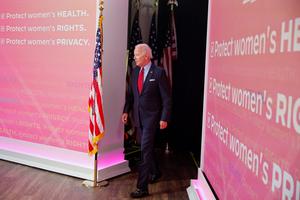Federal LGBT Employment Guidance ‘An Outrageous Overreach’ One Lawyer Says
Under this broad interpretation, simply stating the teaching of the Catholic Church on marriage could land an employee in trouble, John Bursch of Alliance Defending Freedom argued.

WASHINGTON — Recent federal LGBT nondiscrimination guidance for employers goes far beyond the law, one legal and religious freedom expert told CNA.
“This is an outrageous overreach compared to what the Supreme Court said [in Bostock v. Clayton County],” said John Bursch, senior counsel and vice president of appellate advocacy with the group Alliance Defending Freedom, in a June 22 interview with CNA
The Equal Employment Opportunity Commission (EEOC) in June promoted its online resources about “sexual orientation and gender identity workplace rights.” The EEOC cited the June 2020 Supreme Court ruling in Bostock v. Clayton County as the legal basis for its findings.
The court ruled in Bostock that employers could not hire or fire employees based on their sexual orientation or self-determined gender identity. Title VII of the Civil Rights Act prohibits sex discrimination in the workplace, and the court extended that definition of “sex” to include sexual orientation and gender identity as protected classes.
The ruling, said Bursch, who argued the case before the court, did not address issues of access to single-sex facilities such as locker rooms, showers, bathrooms, or shelters. It did not forbid employers from instituting sex-specific dress code policies. Rather, he said, the court simply decided “you can’t fire someone simply for being gay or transgender.”
“But now what the EEOC does is it extends the ruling to all of those things,” he said. “It’s almost like they’re thumbing their nose at the Supreme Court and saying ‘okay, you gave us an open door, so now we’re going to run with it and do all the things that you declined to do.”
Under the EEOC guidance, unlawful workplace discrimination could take any number of forms toward someone identifying as gay, lesbian, bisexual, or transgender.
Workers must have access to sex-specific facilities – such as bathrooms – based on their self-determined gender identity and not their biological sex, the commission said.
According to the EEOC, “if an employer has separate bathrooms, locker rooms, or showers for men and women, all men (including transgender men) should be allowed to use the men’s facilities and all women (including transgender women) should be allowed to use the women’s facilities.”
Sex-specific dress codes based on a worker’s biological sex would also be unlawful, the EEOC said: “Prohibiting a transgender person from dressing or presenting consistent with that person’s gender identity would constitute sex discrimination.”
The EEOC also stated that unlawful workplace harassment “can include, for example, offensive or derogatory remarks about sexual orientation (e.g., being gay or straight),” and “can also include, for example, offensive or derogatory remarks about a person's transgender status or gender transition.”
Under this broad interpretation, simply stating the teaching of the Catholic Church on marriage could land an employee in trouble, Bursch argued.
“So, if you were a Catholic employee at a company,” he said, and a coworker inquired about the Church’s teaching on marriage, “you could be brought into your supervisor’s office and threatened with a hostile work environment charge and even termination, simply for talking about that topic.”
However, the EEOC guidance will not just invite workplace religious freedom disputes, but many different conflicts that may not be religious in nature, Bursch warned.
In the case of a Christian professor at Shawnee State University who addressed students as “Mr.” and “Ms.”, the school threatened to fire the professor unless he used the preferred pronouns of a student identifying as transgender.
Not using a self-identified transgender employee’s “preferred pronouns” could also constitute unlawful workplace discrimination, the EEOC has said, if the “misuse” is “repeated” and not just “accidental.”
The Sixth Circuit court in March ruled in favor of the professor, Nicholas Meriwether, but it is still “not clear” what free speech rights an employee of a private institution would have in such a case, Bursch noted. Shawnee State University is a public institution.
The EEOC guidance, Bursch said, “is just going to create a huge unnecessary mess” and result in more litigation. “They’re using Bostock as a cover – almost like a Trojan Horse,” he said, “to introduce all these new concepts into federal law that didn’t exist before.”
















